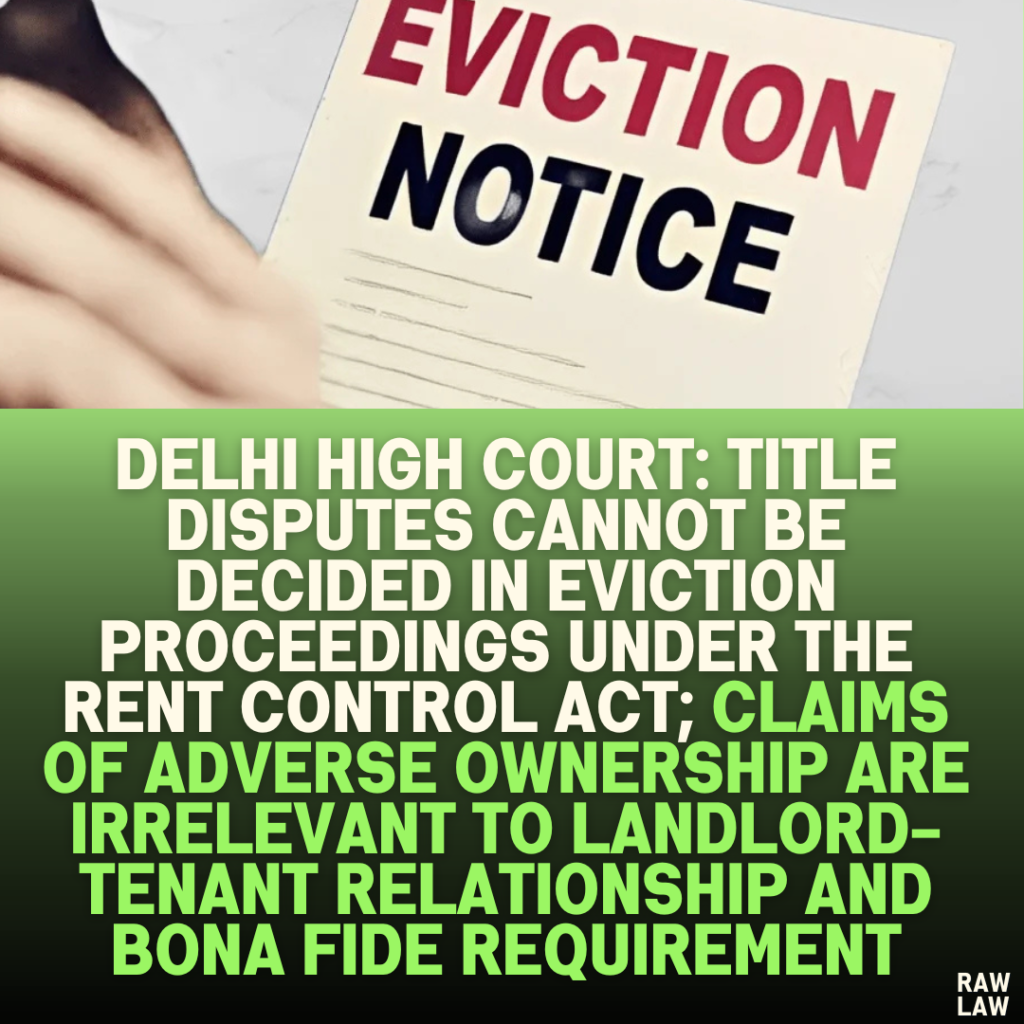Court’s Decision
The Delhi High Court set aside the order of the District Judge, which had allowed a third party’s impleadment in an eviction petition. The court restored the Additional Rent Controller’s (ARC) earlier decision that rejected the third party’s claim. It concluded that eviction proceedings under the DRC Act do not entertain disputes over property title or ownership. The court directed the trial court to expedite the hearing of the eviction petition, originally filed in 2012, to prevent further delays.
Facts
- The petitioner filed an eviction petition in 2012 under Section 14(1)(e) of the DRC Act, citing bona fide need to evict tenants occupying a property located in Yusuf Sarai, New Delhi.
- The tenants (respondents 2 and 3) filed for leave to defend, which was granted. Both parties completed their evidence, and the matter was listed for final arguments.
- Subsequently, a third party (respondent 1) claiming co-ownership of the property filed an application under Order I Rule 10 of the CPC to become a party in the eviction proceedings.
- The Additional Rent Controller (ARC) dismissed this application, reasoning that impleadment of a party claiming adverse title is not permissible in eviction cases.
- The District Judge reversed the ARC’s decision and allowed the impleadment, prompting the petitioner to challenge this decision before the High Court.
Issues
- Whether a third party claiming co-ownership of the property can be impleaded in an eviction petition under the DRC Act.
- Whether the Rent Controller has the jurisdiction to decide disputes related to property ownership or title in eviction proceedings.
Petitioner’s Arguments
- The eviction petition is limited to determining the landlord-tenant relationship and the petitioner’s bona fide requirement for the property. Ownership disputes are irrelevant to such proceedings.
- The third party’s claim of co-ownership is already under consideration in a separate civil suit filed in 2019.
- Allowing the impleadment of the third party would unnecessarily delay the eviction process, which has already been prolonged since 2012.
- The petitioner relied on the Supreme Court judgments in Kanaklata Dass v. Naba Kumar Dass and Smt. Shanti Sharma v. Smt. Ved Prabha, which clarified that disputes of title or ownership cannot be adjudicated in eviction proceedings.
Respondent’s Arguments
- The third party (respondent 1) claimed to be the co-owner of the property by inheritance. They argued that their presence in the eviction proceedings was necessary to protect their ownership rights.
- They contended that if the eviction petition proceeded without their participation, it could prejudice their ownership claims.
Analysis of the Law
The High Court extensively referred to precedents and principles of law concerning eviction proceedings:
- Limited Scope of Eviction Proceedings:
- Eviction cases under the DRC Act focus solely on the landlord-tenant relationship and the bona fide requirement of the landlord.
- Ownership disputes or title claims are extraneous to such proceedings.
- Principle of Necessary and Proper Parties:
- A necessary party is one whose presence is essential for the effective adjudication of the case. A proper party is one whose presence aids in resolving all aspects of the dispute.
- In eviction cases, only the landlord and tenant are necessary parties. Third parties claiming adverse title are neither necessary nor proper parties.
- Precedents:
- Kanaklata Dass v. Naba Kumar Dass (2018): The Supreme Court held that a third party claiming co-ownership is not a necessary party in eviction cases.
- Ruma Chakraborty v. Sudha Rani Banerjee (2005): The Supreme Court emphasized that landlords cannot be compelled to implead third parties unless their presence is essential for the case.
Precedent Analysis
The court reinforced its reasoning with earlier judgments:
- Kanaklata Dass Case:
- The court held that the question of title is not germane to eviction proceedings.
- The existence of a landlord-tenant relationship and bona fide need suffices for the court to pass an eviction order.
- Ruma Chakraborty Case:
- Plaintiffs (landlords) have the right to choose the parties they wish to proceed against.
- No third party can compel their inclusion unless they demonstrate that their absence would render the proceedings ineffective.
- Kasthuri Radhakrishnan Case:
- A co-owner has the right to file an eviction petition without requiring all co-owners to join the suit.
Court’s Reasoning
- The High Court noted that the presence of the third party claiming adverse title was unnecessary for determining the landlord-tenant relationship and bona fide requirement under the DRC Act.
- It held that allowing the third party’s impleadment would unnecessarily complicate the eviction proceedings, which are meant to be summary in nature.
- The court emphasized that the respondent’s ownership claims could be decided independently in their pending civil suit without affecting the eviction proceedings.
Conclusion
The High Court allowed the petition and restored the ARC’s order dismissing the impleadment application. It clarified that title disputes must be resolved in civil suits and not in eviction cases. The court directed the trial court to expedite the eviction proceedings to prevent further delays.
Implications
This judgment reaffirms the limited scope of eviction proceedings under rent control laws. It ensures that such proceedings remain focused on landlord-tenant issues and are not burdened by collateral ownership disputes. By emphasizing the distinction between eviction and title matters, the court upholds the efficiency and clarity of the legal process for eviction cases.



